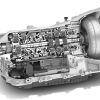
Does Lowering Your Car Make it Faster?
How many times have you pulled up next to a lowered Honda Civic at a stoplight and marveled at the fact that it’s sitting two inches off the ground and wondered why anyone even do that to their car? Lowering your car can make it look better and even handle better when done properly. But some might wonder: Can it make your car faster?
How do you lower a car?
In case you’re not in tune with the car enthusiast scene, lowering a car is when you lower the car’s stance and center of gravity via aftermarket springs and shocks, coilovers, or with an air suspension. Using a set of matched springs and shocks can effectively lower a car by less than an inch and up to even three inches without sacrificing too much in the way of ride quality and even produce better handling characteristics.
Coilovers, on the other hand, are pre-assembled spring and shock assemblies in which you can adjust the height and damping via an adjustable spring perch and valve. With coilovers, your car’s ride quality and height will depend on how you adjust them, but in general, you can expect a much stiffer and lower ride that you would typically get with regular springs and shocks.
An airbag suspension utilizes balloon-like bags that hold up the car’s chassis and replaces the car’s normal spring suspension. You can inflate the bags via a switch in the car to raise it or deflate them to lower it.
Pros of lowering a car
Considering that lowering your car properly, as opposed to just cutting your stock springs, can improve the car’s the handling and cornering properties, it can technically make the car quicker. However, lowering a car does not make it faster as far as it’s horsepower or torque output. Although, there are other benefits to modifying a car’s suspension.
For starters, a lowered car will typically handle better than it does when it’s at stock ride height and lean less in the corners. It will also provide a much stiffer and sportier ride, like a sports car, which is usually the desired effect for anyone that wants to lower their car.

Cons of lowering a car
Lowering your car can also have its drawbacks, though. The stiffer ride means that your daily errand duties will be far less comfortable and the lowering its ride height will alter the car’s suspension geometry, which means that the tires can wear out faster. Also, depending on how much you lower the car, you might not be able to use a standard car jack and it will have a higher chance of bottoming out on rougher roads.
Should you lower your car?
Ultimately, lowering your car comes with some added benefits including improved handling characteristics and possibly better acceleration due to the added traction. However, for street purposes, lowering your car can be detrimental to its ride quality and everyday practicality. So the next time you pull up beside that lowered Civic, you’ll know why they lowered it.



